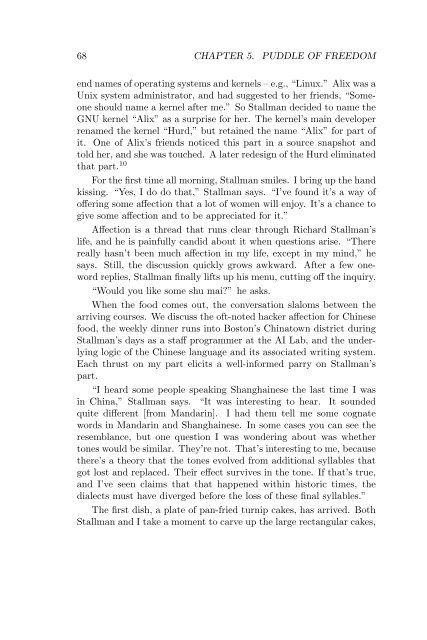Create successful ePaper yourself
Turn your PDF publications into a flip-book with our unique Google optimized e-Paper software.
68 CHAPTER 5. PUDDLE OF FREEDOM<br />
end names of operating systems and kernels – e.g., “Linux.” Alix was a<br />
Unix system administrator, and had suggested to her friends, “Someone<br />
should name a kernel after me.” So Stallman decided to name the<br />
GNU kernel “Alix” as a surprise for her. The kernel’s main developer<br />
renamed the kernel “Hurd,” but retained the name “Alix” for part of<br />
it. One of Alix’s friends noticed this part in a source snapshot and<br />
told her, and she was touched. A later redesign of the Hurd eliminated<br />
that part. 10<br />
For the first time all morning, Stallman smiles. I bring up the hand<br />
kissing. “Yes, I do do that,” Stallman says. “I’ve found it’s a way of<br />
offering some affection that a lot of women will enjoy. It’s a chance to<br />
give some affection and to be appreciated for it.”<br />
Affection is a thread that runs clear through Richard Stallman’s<br />
life, and he is painfully candid about it when questions arise. “There<br />
really hasn’t been much affection in my life, except in my mind,” he<br />
says. Still, the discussion quickly grows awkward. After a few oneword<br />
replies, Stallman finally lifts up his menu, cutting off the inquiry.<br />
“Would you like some shu mai?” he asks.<br />
When the food comes out, the conversation slaloms between the<br />
arriving courses. We discuss the oft-noted hacker affection for Chinese<br />
food, the weekly dinner runs into Boston’s Chinatown district during<br />
Stallman’s days as a staff programmer at the AI Lab, and the underlying<br />
logic of the Chinese language and its associated writing system.<br />
Each thrust on my part elicits a well-informed parry on Stallman’s<br />
part.<br />
“I heard some people speaking Shanghainese the last time I was<br />
in China,” Stallman says. “It was interesting to hear. It sounded<br />
quite different [from Mandarin]. I had them tell me some cognate<br />
words in Mandarin and Shanghainese. In some cases you can see the<br />
resemblance, but one question I was wondering about was whether<br />
tones would be similar. They’re not. That’s interesting to me, because<br />
there’s a theory that the tones evolved from additional syllables that<br />
got lost and replaced. Their effect survives in the tone. If that’s true,<br />
and I’ve seen claims that that happened within historic times, the<br />
dialects must have diverged before the loss of these final syllables.”<br />
The first dish, a plate of pan-fried turnip cakes, has arrived. Both<br />
Stallman and I take a moment to carve up the large rectangular cakes,


